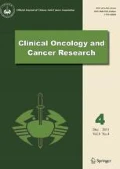Abstract
Objective
The purpose of this study was to evaluate the quality of life (QOL) in Chinese middle-aged male patients with gastric carcinoma after total gastrectomy, to investigate the factors affecting their QOL, and to Study the effectiveness of nursing intervention.
Methods
Structured questionnaire (EORTC QLQ-C30) was used among 162 middle-aged male patients after total gastrectomy (the patients finished the whole process of chemotherapy, and returned home, and society) for data collection and reevaluate the patients’ quality of life with 2 months nursing intervention.
Results
The patient’s quality of life was related to their education level, economic condition, family support, and pathological staging. This study showed that patients got higher scores in Functional scales (except for CF), and lower scores in Symptom scales and single items (except for FI) after receiving intervention than before it was received before.
Conclusion
The study revealed that the QOL in middle-aged male patients after total gastrectomy was worse when there was inadequate attention. After implementing pertinent nursing intervention implementing, patients’ mental attitude and negative behavior were improved, and their QOL was enhanced after returning home and into society.
Similar content being viewed by others
References
Bertuccio P, Chatenoud L, Levi F, et al. Recent patterns in gastric cancer: A global overview. Int J Cancer 2009; 125:666–673.
Kaptein AA, Morita S, Sakomato J. Quality of life in gastric cancer. World J Gastroenterol 2005; 11: 3189–3196.
Sprangers MA, Cull A, Groenvold M, et al. The European Organization for Research and Treatment of Cancer approach to developing questionnaire modules: an update and overview. Qual Life Res 1998; 7: 291–300.
Aaronson NK, Ahmedzai S, Bergman B, et al. The European Organization for Research and Treatment of Cancer QLQ-C30: a quality of life instrument for use in international clinical trials in oncology. J Natl Cancer Inst 1993; 85: 365–376.
Fayers PM, Aaronson NK, Bjordal K, et al. On behalf of the EORTC QUALITY OF LIFE study Group. EORTC QLQ-C30 Scoring Manual. 2nd ed. Brussels; EORTC; 1997.
Li PH. Influencing Factors of Quality of Life of Cancer Patients and Interventions. Hulixue Zazhi 2009; 24: 87–88 (Chinese).
Tan W, Lu Ql, Chen YH. Investigation of the living community behavior of middle-aged men and health maintenance. Shequ Yixue Zazhi 2008; 6: 43–44 (Chinese).
Hu WF. Middle-aged malignant tumor patient’s psychological characteristic and nursing. Laboratory Medicine and Clinic 2009; 6: 215–216.
Zuo Y. Investigation and analysis of the style and the quality of life with gastric cancer patients during the process of chemotherapy. Fujian Yiyao Zazhi 2006; 28: 153–155 (Chinese).
David O. Health related quality of life assessment in clinical t rials of supportive care in oncology. Support Care Cancer 2000; 8: 84–88.
Janunger KG, Hafstrom L, Nygren PA, Glinelius B. A Systematic overview of chemotherapy effects in gastric cancer. Acta Oncol 2001; 40: 309–326.
Sandra K, Holi EY. Evaluating patient distress from cancer related fatigue: An instrument development study. Oncol Nurs Forum 2000; 27: 1425–1431.
Bam-Schlomo Y, Smith GD, Shipley M, et al. Magnitude and causes of mortality differences between married and unmarried men. J Epidemiol Community Health. 1993; 47: 200.
Joung IM, Mheen van de H, Stronks K, et al. Differences in self-reported morbidity by marital status and by living arrangement. Int J Epidemiol. 1994; 23: 91.
Groot CAU, Rutten FFH, Bonsel GJ. Measurement and valuation of quality of life in economic appraisal of cancer treatment. Eur J Cancer. 1994; 30:111–117.
Perihan G, Vedat I, Seref K, et al. Quality of life and sociodemographic characteristics of patient s wit h cancer in turkey. Oncol Nurs Forum 2006; 33: 1171–1176.
Matsushita T, Matsushima E, Marayams M. Assessment of peri-operative quality of life in patients undergoing surgery for gastrointestinal cancer. Support Care Cancer. 2004; 12: 319–325.
Zhang NN, Wu BW. Correlative study on coping style and quality of life of hospitalized patients with gastrointe stinal cancer. Zhongguo Huli Yanjiu 2009; 23: 1602–1604 (Chinese).
Denollet J. Personality and cancer. Curr Opin Psychiatry. 1999; 12: 743–748.
Dimeo FC, Thomas F, Raabe-Menssen C, et al. Effect of aerobic exercise and relaxation training on fatigue and physical performance of cancer patients after surgery. A randomised controlled trial. Support Care Cancer 2004; 12: 774–779.
Shen J, Shen HY. Social support for cancer patients and the quality of life’s survey and nursing. Huli Yanjiu 2006; 20: 2285–2287 (Chinese).
Gao XL, Chen Y, Yu FZ. The factors affecting quality of life and nursing intervention in cancer patients. Zhongguo Wuzhenxue Zazhi 2008; 14: 3341–3342 (Chinese).
Author information
Authors and Affiliations
Corresponding author
About this article
Cite this article
Wang, Y., Wang, Hy., Yin, Gh. et al. The quality of life of Chinese middle-aged male patients with gastric carcinoma after total gastrectomy and nursing intervention. Clin. Oncol. Cancer Res. 7, 151–156 (2010). https://doi.org/10.1007/s11805-010-0511-2
Received:
Accepted:
Published:
Issue Date:
DOI: https://doi.org/10.1007/s11805-010-0511-2




